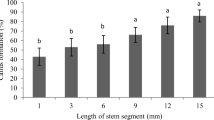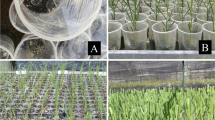Summary
Embryogenic callus consisting of both Type 1, firm, compact, translucent, relatively slow growing callus and Type 2, highly friable, rapidly growing callus with well-formed somatic embryos, were observed in elite maize germplasm, notably B73 and hybrids with B73. Parental genotype is very important in the ability to identify and isolate embryogenic callus after 14 and 28 days in culture. A partial diallel analysis revealed that a large proportion of the genotypic variation was of the additive type although heterosis did positively increase culture response in most cases. A significant negative maternal effect for culture response was noted for inbred B73 from Reid-type germplasm while four lines sampled from Lancaster germplasm showed similar response whether used as male or female. Although significant media differences were observed in some genotypes, culture media did not preclude observation of Type 1 or Type 2 embryogenic cultures in this study after 14 and 28 days. Plants could be regenerated from all genotypes in this study after 14-days of culture, but not all genotypes were capable of sustained subculture and plant regeneration. Plant regeneration from Type 2 cultures of B73 and B73 hybrids has been obtained up to a year after initiation.
Similar content being viewed by others
References
Armstrong CL (1984) Genetic and environmental factors affecting the initiation of friable maize callus capable of somatic embryogenesis. MS Thesis, University of Minnesota, 133 pp
Armstrong CL, Green CE (1984) Establishment and maintenance of friable, embryogenic maize callus and the involvement of L-proline. Planta 164:207–214
Bartkowiak E (1982) Tissue culture of maize. 3. Plantlet regeneration from scutellar callus. Genet Pol 23:93–101
Beckert M, Qing CM (1984) Results of a diallel trial and a breeding experiment for in vitro aptitude in maize. Theor Appl Genet 68:247–251
Bingham ET, Hurley LV, Kaatz DM, Saunders JW (1975) Breeding alfalfa which regenerates from callus tissue in culture. Crop Sci 15:719–721
Brown DCW, Atanassov A (1984) Role of genetic background in somatic embryogenesis in Medicago. Plant Cell Tissue and Organ Culture 4 (in press)
Frankenberger EA, Hasegawa PM, Tigchelaar EC (1981) Diallel analysis of shoot-forming capacity among selected tomato genotypes. Z Pflanzenphysiol 102:233–242
Glover K, Tomes DT (1980) Unpublished results
Green CE (1982) Somatic embryogenesis and plant regeneration from the friable callus of Zea mays. In: Proc 5th Int Congr Plant Tissue Cell Culture, pp 107–108
Green CE, Armstrong CL, Anderson PC (1983) Somatic cell genetic systems in corn. In: Downey K, Voellmy RW, Fazal Ahmad, Schultz J (eds) Advances in gene technology: molecular genetics of plants and animals. Academic Press, New York (Miami Winter Symposium Series, vol 20, pp 147–157)
Green CE, Phillips RL (1975) Plant regeneration from tissue cultures of maize. Crop Sci 15:417–421
Keyes GJ, Collins GB, Taylor NL (1980) Genetic variation in tissue culture of red clover. Theor Appl Genet 58:265–271
Lu C, Vasil V, Vasil IK (1983) Improved efficiency of somatic embryogenesis and plant regeneration in tissue cultures of maize (Zea mays L.). Theor Appl Genet 66:285–289
Neštický M, Novák FJ, Piovarči A, Doleželová M (1983) Genetic analysis of callus growth of maize (Zea mays L.) in vitro. Z Pflanzenzücht 91:322–328
Sprague GF (1946) Early testing of inbred lines of corn. J Am Soc Agron 38:108–117
Tabata M, Motoyoshi F (1965) Hereditary control of callus formation in maize endosperm cultured in vitro. Jpn J Genet 40:343–355
Tomes DT, Swanson EB (1982) Application of in vitro selection to plant improvement. In: Tomes DT, Ellis BE, Harney PM, Kasha KJ, Peterson RL (eds) Application of plant cell and tissue culture to agriculture and industry. University of Guelph, Guelph, Ontaria, Canada, pp 25–43
Vasil V, Vasil IK, Lu C (1984) Somatic embryogenesis in longterm callus cultures of Zea mays L. (Gramineae). Am J Bot 71:158–161
Author information
Authors and Affiliations
Additional information
Communicated by P. Maliga
Rights and permissions
About this article
Cite this article
Tomes, D.T., Smith, O.S. The effect of parental genotype on initiation of embryogenic callus from elite maize (Zea mays L.) germplasm. Theoret. Appl. Genetics 70, 505–509 (1985). https://doi.org/10.1007/BF00305983
Received:
Accepted:
Issue Date:
DOI: https://doi.org/10.1007/BF00305983




